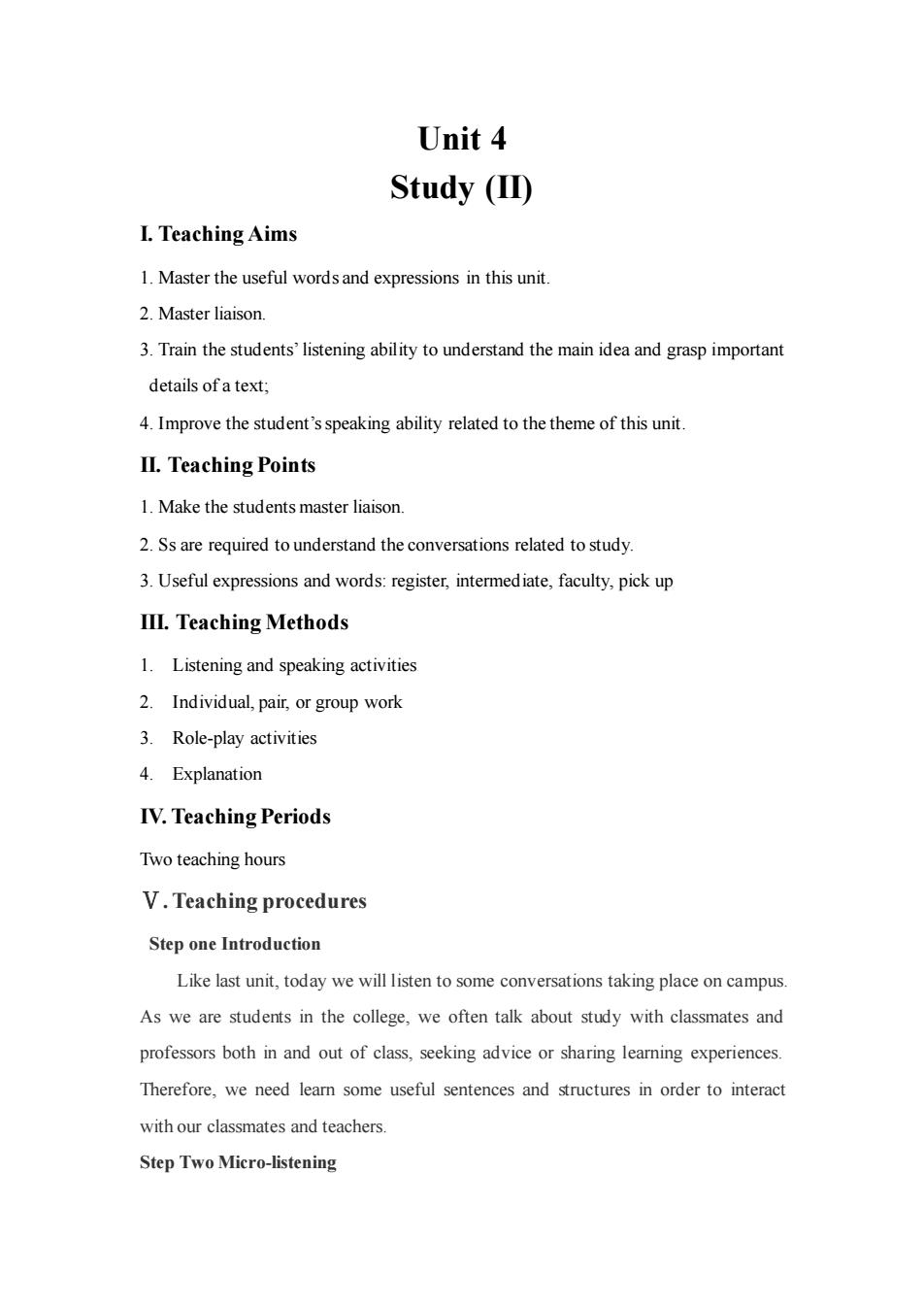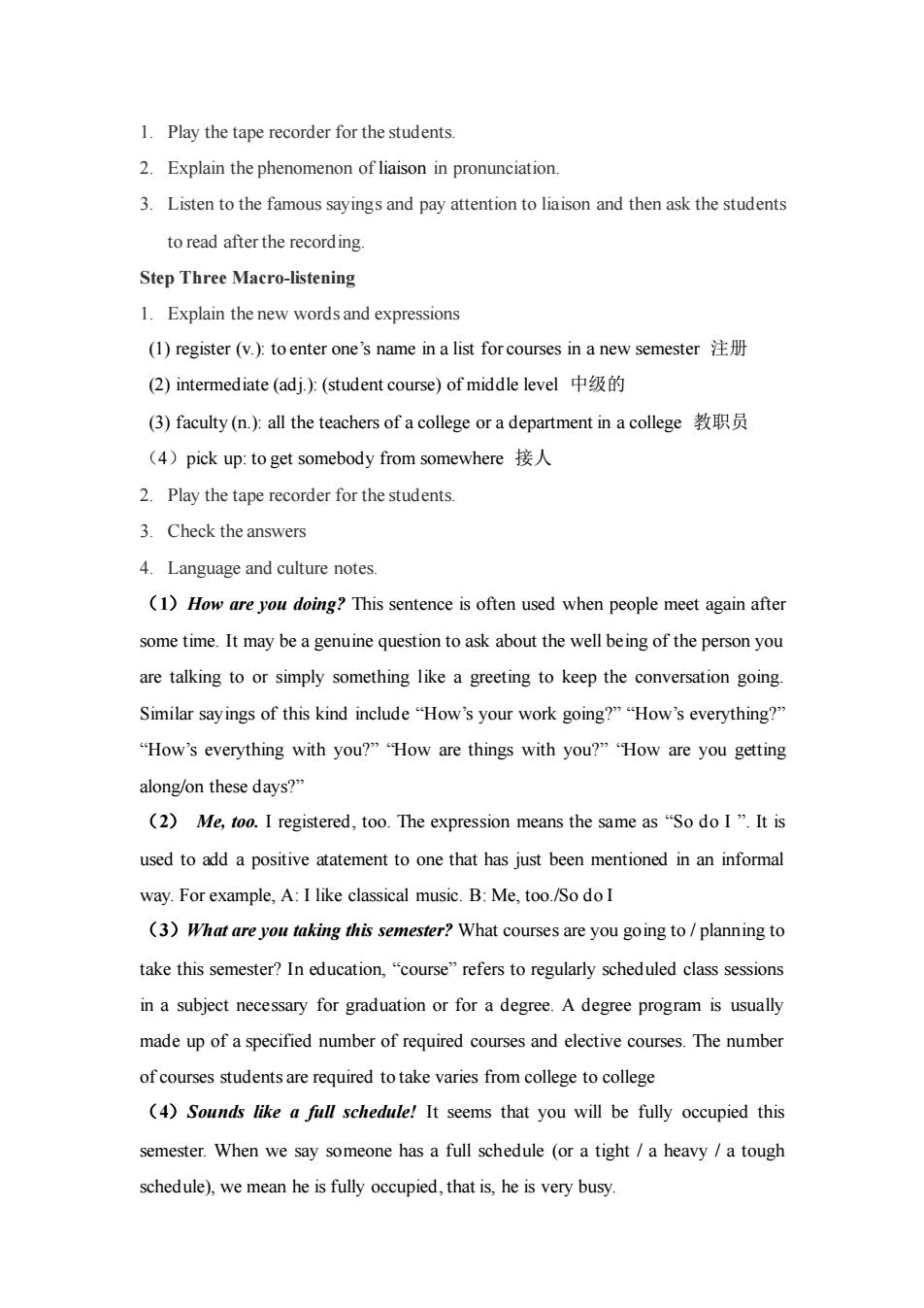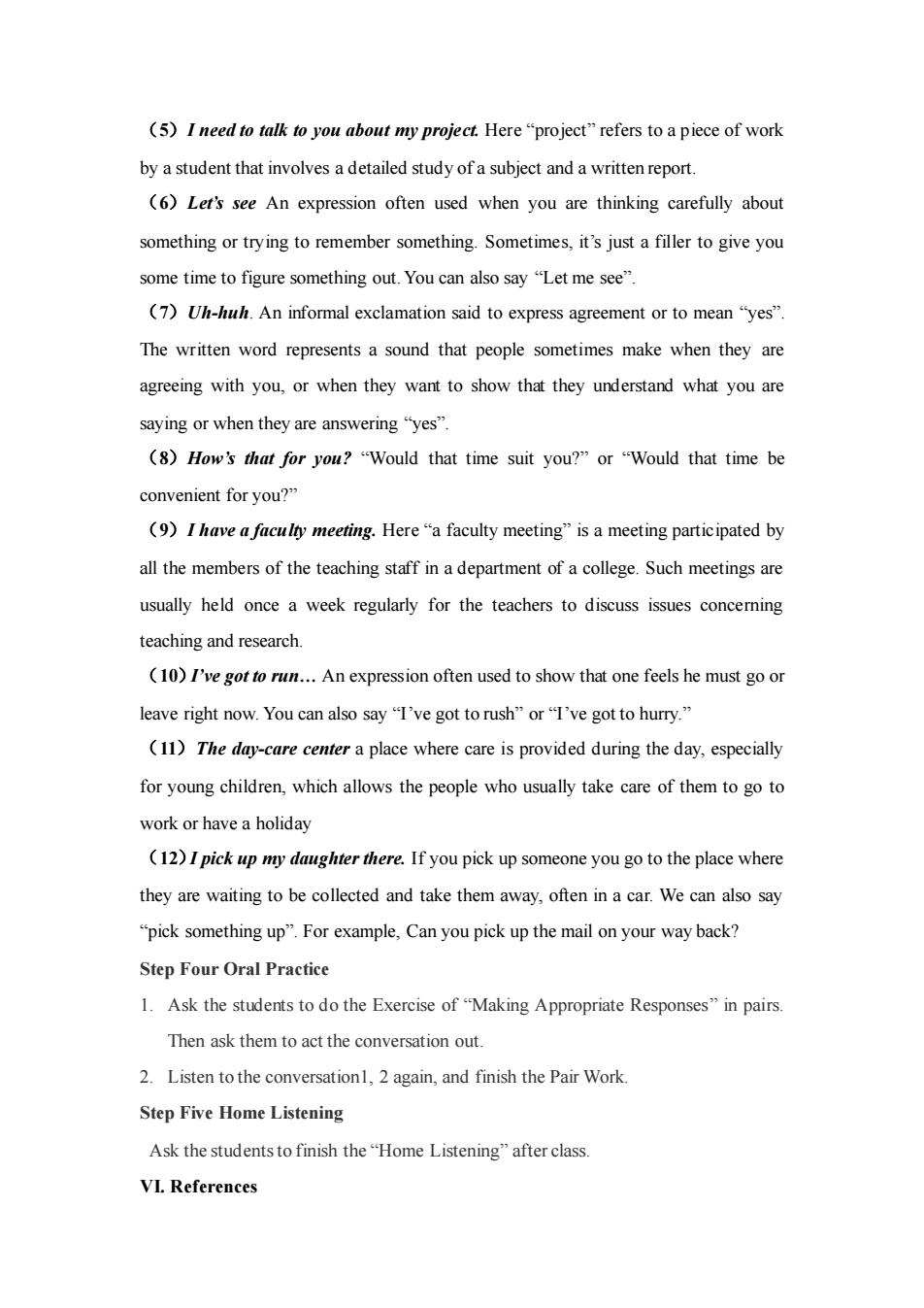
Unit 4 Study (II) I.Teaching Aims 1.Master the useful words and expressions in this unit. 2.Master liaison. 3.Train the students'listening ability to understand the main idea and grasp important details of a text; 4.Improve the student's speaking ability related to the theme of this unit. II.Teaching Points 1.Make the students master liaison. 2.Ss are required to understand the conversations related to study. 3.Useful expressions and words:register,intermediate,faculty,pick up III.Teaching Methods 1.Listening and speaking activities 2.Individual,pair,or group work 3.Role-play activities 4.Explanation IV.Teaching Periods Two teaching hours V.Teaching procedures Step one Introduction Like last unit,today we will listen to some conversations taking place oncampus As we are students in the college,we often talk about study with classmates and professors both in and out of class,seeking advice or sharing learning experiences. Therefore,we need leamn some useful sentences and structures in order to interact with our classmates and teachers Step Two Micro-listening
Unit 4 Study (II) I. Teaching Aims 1. Master the useful words and expressions in this unit. 2. Master liaison. 3. Train the students’ listening ability to understand the main idea and grasp important details of a text; 4. Improve the student’s speaking ability related to the theme of this unit. II. Teaching Points 1. Make the students master liaison. 2. Ss are required to understand the conversations related to study. 3. Useful expressions and words: register, intermediate, faculty, pick up III. Teaching Methods 1. Listening and speaking activities 2. Individual, pair, or group work 3. Role-play activities 4. Explanation IV. Teaching Periods Two teaching hours Ⅴ. Teaching procedures Step one Introduction Like last unit, today we will listen to some conversations taking place on campus. As we are students in the college, we often talk about study with classmates and professors both in and out of class, seeking advice or sharing learning experiences. Therefore, we need learn some useful sentences and structures in order to interact with our classmates and teachers. Step Two Micro-listening

1.Play the tape recorder for the students. 2.Explain the phenomenon of liaison in pronunciation. 3.Listen to the famous sayings and pay attention to liaison and then ask the students to read after the recording. Step Three Macro-listening 1.Explain the new wordsand expressions (1)register (v.):toenter one's name in a list forcourses in a new semester (2)intermediate(adj)((student course)of middle level中级的 (③)faculty(n.)all the teachers of a college or a department in a college教职员 (4)pick up::to get somebody from somewhere接人 2.Play the tape recorder for the students. 3.Check the answers 4.Language and culture notes. (1)How are you doing?This sentence is often used when people meet again after some time.It may be a genuine question to ask about the well being of the person you are talking to or simply something like a greeting to keep the conversation going. Similar sayings of this kind include"How's your work going?""How's everything?" "How's everything with you?""How are things with you?"How are you getting along/on these days? (2)Me,too.I registered,too.The expression means the same as"So doI".It is used to add a positive atatement to one that has just been mentioned in an informal way.For example,A:I like classical music.B:Me,too./So doI (3)What are you taking this semester?What courses are you going to/planning to take this semester?In education."course"refers to regularly scheduled class sessions in a subject necessary for graduation or for a degree.A degree program is usually made up of a specified number of required courses and elective courses.The number of courses students are required to take varies from college to college (4)Sounds like a full schedule!It seems that you will be fully occupied this semester.When we say someone has a full schedule(or a tight/a heavy /a tough schedule),we mean he is fully occupied,that is,he is very busy
1. Play the tape recorder for the students. 2. Explain the phenomenon of liaison in pronunciation. 3. Listen to the famous sayings and pay attention to liaison and then ask the students to read after the recording. Step Three Macro-listening 1. Explain the new words and expressions (1) register (v.): to enter one’s name in a list for courses in a new semester 注册 (2) intermediate (adj.): (student course) of middle level 中级的 (3) faculty (n.): all the teachers of a college or a department in a college 教职员 (4)pick up: to get somebody from somewhere 接人 2. Play the tape recorder for the students. 3. Check the answers 4. Language and culture notes. (1)How are you doing? This sentence is often used when people meet again after some time. It may be a genuine question to ask about the well being of the person you are talking to or simply something like a greeting to keep the conversation going. Similar sayings of this kind include “How’s your work going?” “How’s everything?” “How’s everything with you?” “How are things with you?” “How are you getting along/on these days?” (2) Me, too. I registered, too. The expression means the same as “So do I ”. It is used to add a positive atatement to one that has just been mentioned in an informal way. For example, A: I like classical music. B: Me, too./So do I (3)What are you taking this semester? What courses are you going to / planning to take this semester? In education, “course” refers to regularly scheduled class sessions in a subject necessary for graduation or for a degree. A degree program is usually made up of a specified number of required courses and elective courses. The number of courses students are required to take varies from college to college (4)Sounds like a full schedule! It seems that you will be fully occupied this semester. When we say someone has a full schedule (or a tight / a heavy / a tough schedule), we mean he is fully occupied, that is, he is very busy

(5)I need to talk to you about my project.Here"project"refers to a piece of work by a student that involves a detailed study ofa subject and a written report. (6)Let's see An expression often used when you are thinking carefully about something or trying to remember something.Sometimes,it's just a filler to give you some time to figure something out.You can also say "Let me see". (7)Uh-hh.An informal exclamation said to express agreement or to mean"yes". The written word represents a sound that people sometimes make when they are agreeing with you,or when they want to show that they understand what you are saying or when they are answering"yes". (8)How's that for you?"Would that time suit you?"or "Would that time be convenient for you?" (Ihavefculy meeting.Here"a faculty meeting"is a meeting participated by all the members of the teaching staff in a department of a college.Such meetings are usually held once a week regularly for the teachers to discuss issues conceming teaching and research. (10)I've gottorun.An expression often used to show that one feels he must go or leave right now.You can also say"I've got to rush"or"I've got to hurry." (11)The da-care centera place where care is provided during the day,especially for young children,which allows the people who usually take care of them to go to work or have a holiday (12)Ipick upmydaughter there.If you pick up someone you go to the place where they are waiting to be collected and take them away,often in a car.We can also say "pick something up".For example,Can you pick up the mail on your way back? Step Four Oral Practice 1.Ask the students to do the Exercise of"Making Appropriate Responses"in pairs. Then ask them to act the conversation out. 2.Listen to the conversationl,2 again,and finish the Pair Work. Step Five Home Listening Ask the studentsto finish the"Home Listening"after class VI.References
(5)I need to talk to you about my project. Here “project” refers to a piece of work by a student that involves a detailed study of a subject and a written report. (6)Let’s see An expression often used when you are thinking carefully about something or trying to remember something. Sometimes, it’s just a filler to give you some time to figure something out. You can also say “Let me see”. (7)Uh-huh. An informal exclamation said to express agreement or to mean “yes”. The written word represents a sound that people sometimes make when they are agreeing with you, or when they want to show that they understand what you are saying or when they are answering “yes”. (8)How’s that for you? “Would that time suit you?” or “Would that time be convenient for you?” (9)I have a faculty meeting. Here “a faculty meeting” is a meeting participated by all the members of the teaching staff in a department of a college. Such meetings are usually held once a week regularly for the teachers to discuss issues concerning teaching and research. (10)I’ve got to run… An expression often used to show that one feels he must go or leave right now. You can also say “I’ve got to rush” or “I’ve got to hurry.” (11)The day-care center a place where care is provided during the day, especially for young children, which allows the people who usually take care of them to go to work or have a holiday (12)I pick up my daughter there. If you pick up someone you go to the place where they are waiting to be collected and take them away, often in a car. We can also say “pick something up”. For example, Can you pick up the mail on your way back? Step Four Oral Practice 1. Ask the students to do the Exercise of “Making Appropriate Responses” in pairs. Then ask them to act the conversation out. 2. Listen to the conversation1, 2 again, and finish the Pair Work. Step Five Home Listening Ask the students to finish the “Home Listening” after class. VI. References

1.《大学英语听说》(学生用书),虞苏美,李慧琴主编,上海:上海外语教育出 版社,2006. 2.《大学英语听说》(教师用书),虞苏美,李慧琴主编,上海:上海外语教有出 版社,2006 3.An Advanced English Grammar::薄冰主编.北京:高等教育出版社,1996. 4.牛津高阶英汉双解词典(第六版),牛津大学出版社,2004
1.《大学英语听说》(学生用书),虞苏美,李慧琴主编,上海:上海外语教育出 版社,2006. 2.《大学英语听说》(教师用书),虞苏美,李慧琴主编,上海:上海外语教育出 版社,2006. 3. An Advanced English Grammar. 薄冰 主编. 北京:高等教育出版社,1996. 4. 牛津高阶英汉双解词典(第六版). 牛津大学出版社,2004